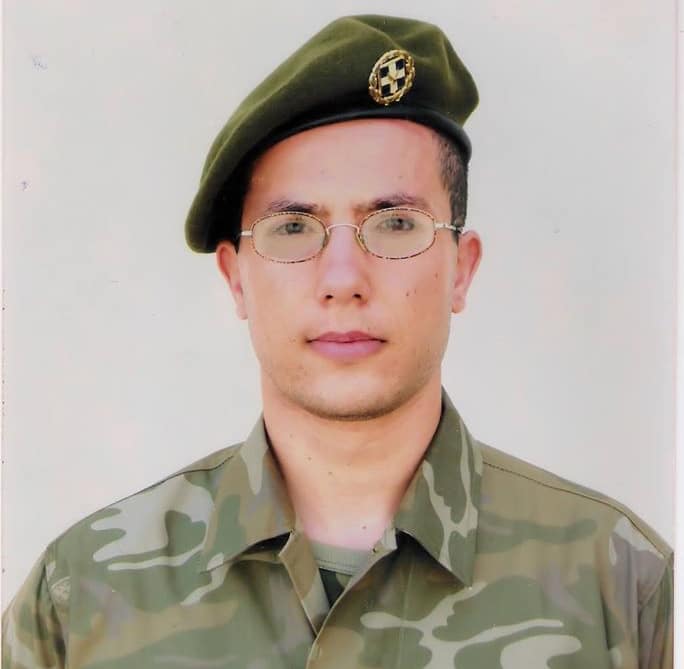By Andria Kades and Jean Christou
As the public waited the verdict as to whether national guardsman Thanasis Nicolaou committed suicide or was murdered in 2005, the court reading painted a horrific picture of army life for the young Australian Cypriot.
Thanasis Nicolaou was found dead under Alassa bridge in September 2005. He was 26. Forensic pathologist Panicos Stavrianos ruled it was a suicide, however the family has long-argued it was a murder coverup.
The European Court of Human Rights has condemned Cyprus for its insufficient investigation into the case, calling it inadequate.
His mother Andriana has led the charge for justice for the past 19 years leading to the third inquest that began last October.
As Judge Doria Varoshiotou approached her verdict almost three hours into the hearing at Limassol court on Friday, she gave a rundown on Thanasis’ last days and hours, his anxiety over being bullied, and the history of the legal aspects.
She described the intense disagreements related to the cause of death during the lengthy proceedings in the case given that the family strongly opposed the initial conclusions by the authorities almost two decades ago that he died as a result of suicide.
According to the judge’s reading of the circumstances of the case, when he went to the army, Thanasis told his mother he had a lot of issues. “Unfortunately, I’m in the worst unit. The guys are ‘paliopeda’ roughly translated as ‘jerks’. They do whatever they want.”
His mother first advised him to wait it out but the situation kept continuing. Andriana told Thanasis to report them to the commanding officer but he was hesitant saying they were all the same. “They’re the type to harm you”.
Andriana held her head in her hands as this was read out.
Thanasis was scared the others in his unit would find him and beat him up if he reported them. Other incidents of bullying and threats concerning a friend of Thanasis in the unit were also relayed during the court hearings, the judge said.
Other soldiers in the unit had set his chair on fire while he was sitting in it, and his clothes had also caught on fire. The second solider later received a permanent exemption on psychiatric grounds.
Thansis was born in Melbourne Australia. He was a member of an Orthodox group and temporarily working at an architect’s office and was ready to open his own after his stint in the Cyprus National Guard.
One of his three siblings told police there was never a chance Thanasis would kill himself. He had dreams for his future. An aunt, Myrianthi said she had seen him ten to fifteen days before his death and she believed the same.
According to the court, Thanasis was forced to make “confessions of love to a lamp”. There were also reports of drug use in the camp and there was no control in the unit. The commanding officer had said he didn’t doubt there were drugs but said there were also inspections. It was generally acceptable that Thanasis did not drink, smoke or take drugs, the court heard.
One staff member at the unit saw Thanasis a week before he died at the office and he was really upset. He said he could not fit in due to language issues and said he couldn’t bear it anymore and broke down in tears.
On September 21, 2005, Thanasis went back home upset. He asked his mother to do something to help him get out.
Then his officer changed and everything went from bad to worse, the court heard.
Three days before Thanasis’ death one of the officers said he appeared anxious and he realised something was on his mind. He said Thanasis wouldn’t share and told him to talk to the commanding officer. The commanding officer told the captain the matter was taken care of.
The commanding officer said he told the other soldiers not to call Thanasis “the Australian” and he was strict about that. The driver of the commanding officer was also involved in the issue.
On September 28, 2005 at 5am, one day before Thanasis’ death, the officer in charge called his driver in who said there had been a small misunderstanding. He recommended the soldier apologise to Thanasis. The soldier said that had already happened.
The senior officer said he called on the driver to keep Thanasis under his wing. He later called Thanasis in and the latter asked to be transferred but was told it would be difficult.
He told Thanasis to come to his office whenever he wanted to talk and have a coffee.
On the eve of his death Thanasis was “more stressed than ever”, the court heard.
He bought snacks, ate with his family and packed his things to return to the army the next morning.
On September 29 he woke up at 5am as usual. Folded his clothes, made his bed, prepared to record something on TV and then left home. At 10.15am the commanding officer called Thanasis’ mother saying he had not reported for duty.
Andriana expressed her concerns to the commanding officer who assured her everything was probably fine. She then called family members. She wanted to call police but the commanding officer told her not to and wait until evening.
At this point in the reading, Andriana bowed her head as did one of her lawyers.
Later that afternoon, she was called to go to the CID department of the police. She walked in and heard from the police radio that a body was found, the court heard. She then went with her eldest son to the scene, saw Thanasis’ car on the hard shoulder and his body under the bridge.
At this point, family members broke down in tears in the court.







Click here to change your cookie preferences